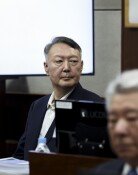Risk Management Needed
Global shocks from the financial crisis facing southern Europe and the world continue. Experts predict that fiscal instability in one or two European countries could trigger another crisis. The debt crisis in southern European countries such as Greece, however, is expected to have a limited impact on the South Korean economy. But this is no reason for complacency given the interdependency of the global economy. For example, the domestic stock market is fluctuating in line with global stocks. Due to the bearish run of global equity markets and security risks in the wake of the Cheonan sinking, the KOSPI fell to the low 1,600 level Thursday.
An official who attended a government meeting on countermeasures in Seoul said Sunday, The negative impact from the European debt crisis and the Cheonan incident were expected. Considering the rapid pace of economic recovery, current account surplus, and previous experience with inter-Korean naval clashes in the Yellow Sea, however, our economy is capable of absorbing external shocks. He added that the government will remain vigilant in responding to the European fiscal crisis and the Cheonan sinking. Except the stock and foreign currency markets, Seoul says it has detected no abnormal signs in the real economy such as exports, supply and demand of raw materials, prices, and the spread of currency stabilization bonds. A more cautious approach is needed, however.
The European Union accounts for 12.8 percent of South Koreas exports, a higher share than those of the U.S. and Japan. So an economic downturn in Europe will deal a heavy blow to the South Korean economy. In addition, if global financial instability expands, the country will be hit hard.
Seoul should also remain alert on the negative consequences arising from the Cheonan incident. Moodys raised Koreas sovereign rating after the sinking because it was forecast to bring limited and short-term effects. Uncertainty is rising, however, after the announcement of the probe results on the cause of the sinking. The possibility of additional provocations by North Korea cannot be ruled out, either.
South Korea should do its utmost to manage risks by keeping a close eye on financial markets in and out of the country and the real economy. No less important is to prevent excessive anxiety by foreign and domestic investors over the South Korean economy. Companies and the people, for their part, should help government efforts by continuing to invest and consume. Going into a panic is exactly what Pyongyang wants, so Seoul and the people must maintain calm at a time like this. This is the best way to minimize the negative impact the Cheonan incident could have on the economy. As U.S. President Franklin D. Roosevelt said at the time of the Great Depression and World War II, The only thing we have to fear is fear itself.




![‘딸’ 같아서…상가 담보로 내준 치매부부, 6억 털렸다[히어로콘텐츠/헌트①-下]](https://dimg.donga.com/c/138/175/90/1/wps/NEWS/IMAGE/2025/12/14/132963612.1.jpg)


